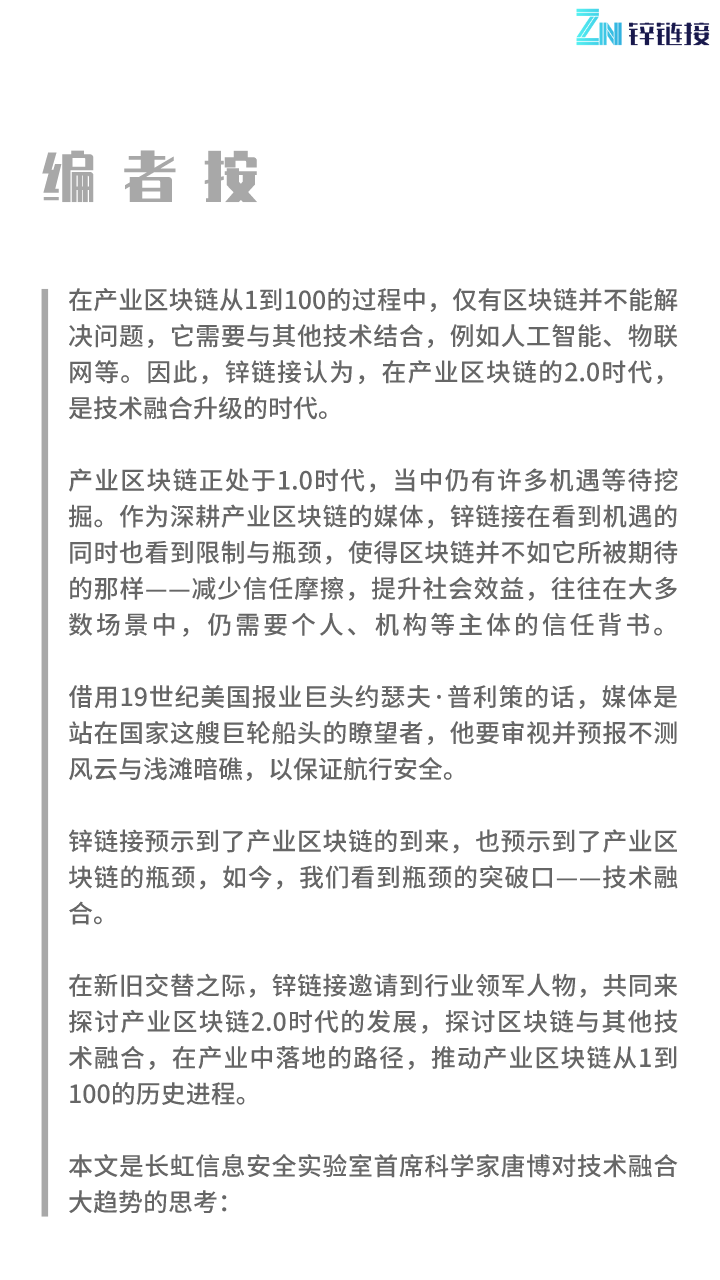In the era of the Internet of Things, the terminalization of "centralized networks" is "abrupt"
Text / Tang Bo
Editor / Wang Qiao
This article first appeared on WeChat public account zinc link (ID: xinlianjie-), pay attention to the public account, and explore the value of the industrial blockchain with us. If you need to reprint the article, please apply for white list on WeChat.

I. Sudden changes in network structure in the age of IoT
The era of the Internet of Things has quietly come to us. Following the Internet and the mobile Internet, the Internet of Things is considered to be the next wave of technology development in the next decade or more.
The so-called Internet of Things is to connect the things around us to form a network to serve us. Combined with the application of artificial intelligence technology, the Internet of Things has brought a lot of imagination to our future life.
- Has Bitcoin fulfilled Henry Ford's energy currency dream?
- Zcash community votes to distribute 20% of mining rewards to support developers
- One article at a glance: the 10-year trough and glory of blockchain
With the development of the times, network technology is constantly evolving. From the connection of the host to the connection of personal computers, from the connection of personal mobile communication devices to the connection of our living space, it has gradually changed from virtual to reality, which has gradually affected our lives.
In the Internet era and mobile Internet, the mainstream network structure is still centralized, that is, a powerful center serves multiple user terminals. Terminals refer to personal computers, smartphones, and tablet computers.
However, due to the sharp increase in the number of terminals in the era of the Internet of Things, the centralized network structure will usher in a sudden change, and application services will gradually migrate from the center to the terminals, forming a distributed network. The more common. This sudden change in network structure will not only change the application architecture and operation mode, but also bring new business models to profoundly change our lifestyle.
Second, ecological development brings new challenges
The abrupt change of the Internet of Things network structure has brought about changes in business models. The inevitable result of this situation is ecological development , that is, the development of business from a central development idea to a coordinated development around an ecological chain or even an ecological circle. The development goals and paths of the two ideas are very different, and the strategic attitude and resource allocation will be very different.
Take the development of traditional electrical appliance manufacturing enterprises as an example. The so-called traditional electrical manufacturing companies often start with one or two categories of terminal products and open the market with product performance and quality. As people's demand for electrical appliances continues to expand, they increase production scale, continue to increase terminal product categories, and integrate industry Diversified industrial groups are formed downstream.
However, the development of electrical technology is relatively slow. In the fierce competition of homogeneity, only brands and low prices can survive, so the complete manufacturing process and quality management system, stable sales channels, lower costs and good after-sales Service has become a necessary condition for winning. In this case, the industry chain has integrated itself to form a handful of large-scale electrical industry groups. There is a natural competitive relationship between these centralized industrial groups, and their respective developments lack coordination or collaboration. Necessary.
Since the rise of the Internet tide, networkization has become popular, data circulation and convergence have intensified, and data-centric business models have begun to form. Due to the low cost of data replication and migration, Internet companies have quickly grown from zero to industry giants, and Utilize the advantages of computer technology to continuously expand the collection and aggregation of data to form a centralized business advantage with a data monopoly advantage.
Similarly, Internet giants compete with each other and rarely cooperate. With the popularization and open development of computer technology today, traditional electrical manufacturing companies are pursuing information transformation in management and products, but the most obvious obstacle on this road is the lack of genes for data operations.
Although the intelligentization of individual electrical terminals can be easily achieved, and it is not difficult to collect and respond to the operation data of electrical equipment, it is a very challenging thing to commercialize the data and continue to generate value. This is exactly the most important thing for Internet companies. good at.
The advent of the Internet of Things era provides a common stage for Internet companies and traditional electrical appliance manufacturers, and promotes the integration of the two industries to form an organic industrial ecology, which is a rare development opportunity for both parties. The difference between the so-called ecological and traditional supply chains is not only to open up the upstream and downstream, but also to carry out horizontal cooperation with some product competitors, which is often the most difficult to change and break through.
Endogenous security mechanisms break data silos
The future of eco-collaborative development requires us to change our mindset, and even more, we need to be technically prepared. For cross-enterprise cooperation, data sharing is often the most sensitive topic. However, data is like blood in the collaborative development of the Internet of Things. It is indispensable, and only continuous flow can generate value.
Therefore, how to ensure the secure and reliable transmission and calculation of data across domains is a key technical problem that needs to be solved urgently.

The birth of blockchain technology provides the possibility to completely solve the problem of trusted data sharing. Blockchain technology, as a key technology to solve the trust problem of information systems, can provide an endogenous security mechanism to realize data trust sharing through the combination of passwords, support penetration and efficient collaboration of information systems, and break down data islands between systems.
In the age of the Internet of Things, people imagine scenarios such as smart homes, smart communities, smart transportation, and smart factories can greatly improve production and life efficiency. To achieve ubiquitous intelligent infrastructure, it is also necessary to achieve efficient sharing of data on the network infrastructure and establish penetrating trust to complete the connection of IoT application services between ecological partners.
Blockchain plays an irreplaceable role in the construction of digital economic infrastructure. The controllability and transparency of data sharing and use is important not only for individual users, but also for system operators, and it is the embodiment of system service sovereignty.
For example, in the Internet of Vehicles, the communication of information between lights and cars. Because of the strong mobility of cars and the immovability of lights, it is difficult to achieve centralized management and data exchange. Therefore, the distributed solution is the only choice. Trust and security are unavoidable elements, and blockchain technology and related applications are the foundation that can satisfy both elements at the same time. The distributed demand for such collaborative scenarios abounds in the Internet of Things, and there is a huge market opportunity for the deep integration of blockchain and the Internet of Things.
Fourth, high-quality development set sail
In the context of digital economy construction, business model innovation and technological innovation interact, and a distributed business model based on blockchain is a catalyst for high-quality development. Distributed commerce advocates the development from a traditional bank-centric business system to a people-centric and technology-based flexible business ecosystem.
This elastic business ecosystem needs to achieve penetrating trust, that is, the efficient sharing of data between systems, which is also the area where blockchain technology is best at. Distributed applications based on blockchain have not only advantages in commerce, but also effective integration in the fundamentals of smart cities such as government affairs, public welfare, medical care, and education.
The penetration of data sharing trust opens up not only the convenience of work and life for people living in cities, but also the new vitality and new momentum for the growth of the real economy.
In the future, household appliances and furniture may be devices that serve people ’s home life. Intimate and intelligent life services require the joint action of multiple devices and Internet information, so the benefits of services should also be shared between devices. This sharing The mechanism is a form of distributed commerce, which needs to rely on distributed accounting technologies such as blockchain to achieve, promote ecological cooperation between service providers and equipment manufacturers, and create more new service scenarios and requirements centered on people. To promote the value conversion of IoT application services.
In the world where everything is connected, our lives will become more and more intelligent, technological innovation represented by blockchain will become the main driving force for economic growth, and the road of high-quality development will become more and more clear.
We will continue to update Blocking; if you have any questions or suggestions, please contact us!
Was this article helpful?
93 out of 132 found this helpful
Related articles
- SEC says Telegram's Gram tokens are less valuable than donuts
- Institutional investor interest is worrying, last week Bakkt Bitcoin options trading volume was zero
- Hardcore | How to use blockchain to improve national infectious disease surveillance and early warning network?
- Share | Blockchain Governance Proposal
- Research Report | Interpretation of Psychological Misunderstandings of Investors' Trading
- Blockchain investment: which "platform coin" has more investment value?
- The central bank's digital currency occupies the "C position" of the Davos Forum. Why is it popular among countries?





